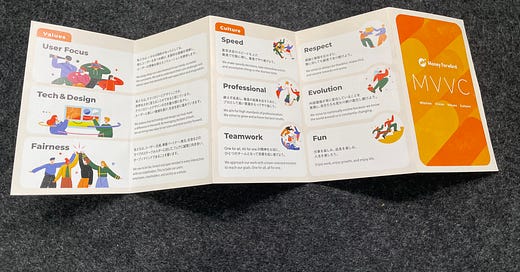My First Month and Impressions of Money Forward
Joining a Japanese company felt daunting, but Money Forward redefined my expectation of Japanese work culture
A month ago, I made the jump from Singapore to Japan, starting my new role at Money Forward. It’s been a short time, but I’ve already seen enough to know this place is different.
I’ve always loved Japan—visited many times as a tourist—but working here was a different story. Before I moved, I had my doubts. Japan’s work culture has a reputation: rigid, long hours, and not very flexible. It was enough to make me hesitate. But when I interviewed with Money Forward, it didn’t feel like the typical Japanese company. Something about it stood out. That’s why, with other offers on the table, I chose this one.
Now that I’ve been here a month, what I felt during the interview has only been confirmed. The culture at Money Forward isn’t just something being talked about. It’s something you see in how people act every day. It’s not about big, flashy values—it’s in the small things. People are supportive, open, and always looking to improve. It’s a place that’s always evolving.
Embracing a Culture of Evolution
As a software engineer, one of the first things that struck me about Money Forward is how deeply our culture of evolution is embedded in everything we do, especially our approach to AI. This isn’t about jumping on the latest trend or making flashy tech investments for the sake of headlines. It’s a thoughtful, deliberate effort to see if AI can genuinely enhance productivity. We experiment with small-scale trials, not just to chase innovation, but to really understand what works and what doesn’t.
For example, the engineering org had already integrated GitHub Copilot to the engineering workflow and were pretty happy with the results. But we didn’t stop there—we kept exploring, looking for what might be even better. I got involved in a trial for a new AI tool, and the productivity boost was immediate.
It’s this constant push to not settle for “good enough” that makes this place stand out. It’s not just about being cutting-edge; it's about staying open to new possibilities, while always weighing the risks, especially around data security. If there’s even a slight chance that our internal code or data could be compromised, the answer is a firm no. It’s a balancing act—progress without recklessness—and it makes me feel like we are serious about both innovation and responsibility.
Open Communication and Transparency
From my first few weeks here, it became clear that even the smallest questions can reveal a lot about a company’s culture. It started with a simple question. I had a minor issue, so I DMed my team lead on Slack. He replied right away, but then added, "Next time, let’s keep it in the team channel if possible, even for small things." The idea was to keep everything visible, so the whole team could learn from even the small questions.
It was a seemingly insignificant moment, but it carried a big message about transparency and trust. I realized that here, communication isn't just about getting answers—it's about ensuring everyone has access to the same knowledge and no one is left behind. It’s a simple principle, but it goes a long way in building a culture where everyone feels informed and included.
The Power of Emotip
At Money Forward, there are deliberate mechanisms designed to subtly shape our culture. Emotip is one of them. Emotip is a system where we get points every week to give to colleagues as a way to say thank you. Sure, those points can be converted into cash bonus, but that’s not the point. What matters is the act of giving them. It’s a way to publicly recognize the small acts of kindness, the quick helps, and the moments of support that often go unnoticed.
Our team uses Emotip a lot—far more than I expected. And it’s not just for big wins. It’s for the little things: someone helping you debug a problem, someone staying late to help prep for a presentation, or even just making the team laugh during a stressful week. It’s an easy way to show appreciation, and it’s amazing how much it lifts the mood. It turns out, those small gestures go a long way in building team spirit and reminding everyone that their work—and their kindness—matters.
Not Perfect, But Striving for Better
Reflecting on my first month, I would say Money Forward isn’t perfect—no company is—but what I’ve come to appreciate most is that we know it, and we’re always trying to do better. There’s an honesty here that I haven’t seen everywhere. People aren’t afraid to admit when something isn’t working, and that openness makes it easy to speak up and offer suggestions. It’s the kind of place where feedback is not only welcomed, but expected.
This past month, I’ve seen how those small, consistent actions add up. Whether it’s adopting a new tool, shifting a communication practice, or simply acknowledging someone’s effort, there’s a constant sense of movement towards something better. It’s not about big, dramatic changes. It’s about showing up every day, looking for ways to improve, and doing it together. That’s what makes me excited to be here—the sense that we’re all in this, genuinely trying to grow, both as individuals and as a team. And in that, I see a lot of promise for the future.
If you are interested in joining Money Forward, you can find more information on the following site https://recruit.moneyforward.com/en/




